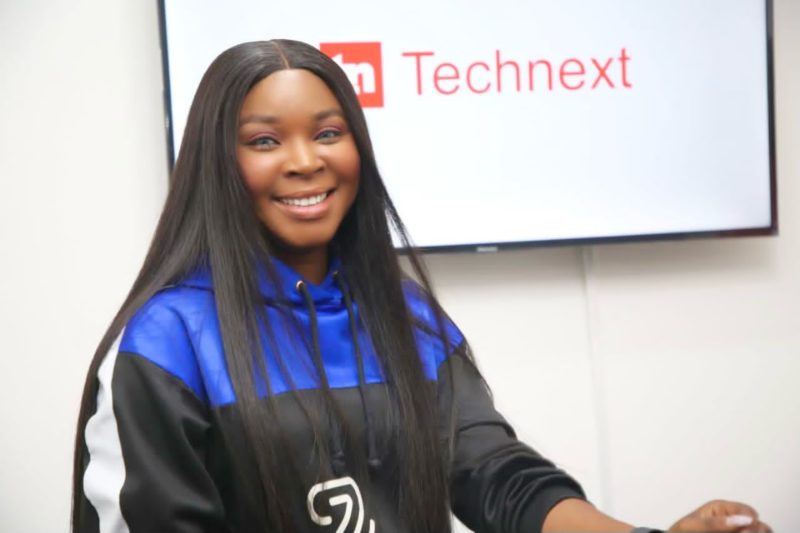Vivian Agbata, PRO of Zenithchain shares insight on visibility for women in tech

It is common knowledge that women are underrepresented in the worldwide technology sector. While more women are beginning to create tech professions in a male-dominated field, women still do not receive the same level of visibility as their male counterparts due to this underrepresentation.
Being the Public Relations Officer of Zenithchain, a blockchain business requires Vivian Agbata to continuously make herself heard in places where conversations are dominated by men. In a video chat with Computing Next’s Women in Tech series, she revealed that her journey into tech is one of self-discovery via grit and tenacity.
The Lagos-born graduate of Economics from the University of Port-Harcourt returned home to hustle and get his life started. After working in marketing, promotion, and merchandising, she decided to pursue a career in technology.
Her interest in technology began during her undergraduate years, when she observed her male classmates coding but felt she couldn’t do it. But she eventually made the decision to go for it, and with her expertise as an economist, she landed a job as a financial analyst with Zenithchain, a blockchain firm.
“I really wanted a change of career, to go into something sustainable that I know won’t wear off in the future. I decided to focus on tech because it’s the future. With prior knowledge of finance, while studying economics, I thought it would be interesting to go into fintech. It gave me direction on what I want to do in the tech industry.”
Vivian Agbata, PRO Zenithchain
Her desire to pursue a career in technology required her to re-learn technical skills. This encouraged her to study Management Information Systems at the National Institute of Information Technology. While working as a financial analyst, the company recognized her exceptional marketing skills and promoted her to Public Relations Officer.
A unicorn in the blockchain industry

Blockchain technology is one of the most significant advancements of our time. On the blockchain, there are unlimited possibilities, including bitcoin, the most popular product based on the ledger, Decentralised Finance (DeFi), NFTs, and, of course, the metaverse.
Women make up a small proportion of the Nigerian tech sector. According to a survey of 93 technology companies conducted by ONE Campaign and the Center for Global Development, only six had a woman in a key executive position. Worse, more than one-third of the organizations questioned had no female employees at all.
Women are even less prevalent in the blockchain industry. How does Vivian manage to keep her end of the conversation as someone who needs to continuously talk about this sector as part of her job?
“Before going into any form of meeting, I conduct extensive homework on everything.” “I may not be completely knowledgeable about a subject, but I always have an idea,” she explained.
Vivian is frequently the lone woman in the room, which she admits has its drawbacks.
“One important difficulty is being spoken over. It’s a widespread issue that isn’t limited to the tech industry. They believe you have little to offer. If you do have something to give, you become unlikable because they believe you are invading their territory. “There is always skepticism about your abilities in the tech world,” she remarked.
Her answer to this problem, on the other hand, is to speak up whenever and whenever she can.
“I try to show my capacity in any space. So when opportunities come or when I seek them out, I am always prepared. Women in tech should push themselves out to be heard, don’t let anything shut you down or out at any point,” Vivian said.
Female representation in tech

The widespread perception is that being in the computer industry necessitates knowing how to code. This frequently inhibits individuals from entering the space. However, the truth is that the rapidly expanding technology business is vast, allowing people to work in a variety of roles. Other jobs that aren’t directly related to software development include project management, technical writing, and design.
For Vivian, having basic computer skills is the starting point for a career in technology. She took HTML, CSS, and JavaScript courses to gain some computing skills, but she came to the conclusion that becoming a developer isn’t the only way to have a tech profession.
“You can learn shortcuts on how to type so you don’t get scared. Go on Google, there are a lot of things. Know the basic things. We don’t have to all be developers”
Vivian Agbata
Vivian, an ardent moviegoer, understands the importance and influence of other women in technology. Jacquelyn Madu, CEO of AzaPay, and Ruth Iselema, CEO of Bitmama are two women in the tech field she admires.
“There are a lot of amazing ladies out there; I appreciate their strength and hard work.” Jacquelyn, the CEO of Azapay and Bitmama, is one such example. “It’s very interesting,” she replied.
As a tech player, Vivian sees it as a new and fascinating life, one in which she has more to contribute and which may offer her more. She is zealous about introducing additional women to this way of life.
During my talk with Vivian, it was clear that she enjoys educating her friends and anybody else who is willing to listen about the numerous opportunities available in the crypto realm and on Blockchain.
Her advise to women in tech and those wishing to pursue a career in tech is to be productive and make a difference.
“More women need to take up space. Make noise, be productive, make yourself known and create an impact. There’s a lot out there for women in tech, it’s not for men alone.”
Vivian Agbata
The importance of visibility for women in technology cannot be emphasized because it inspires other women while recognizing the accomplishments of women in the field.







